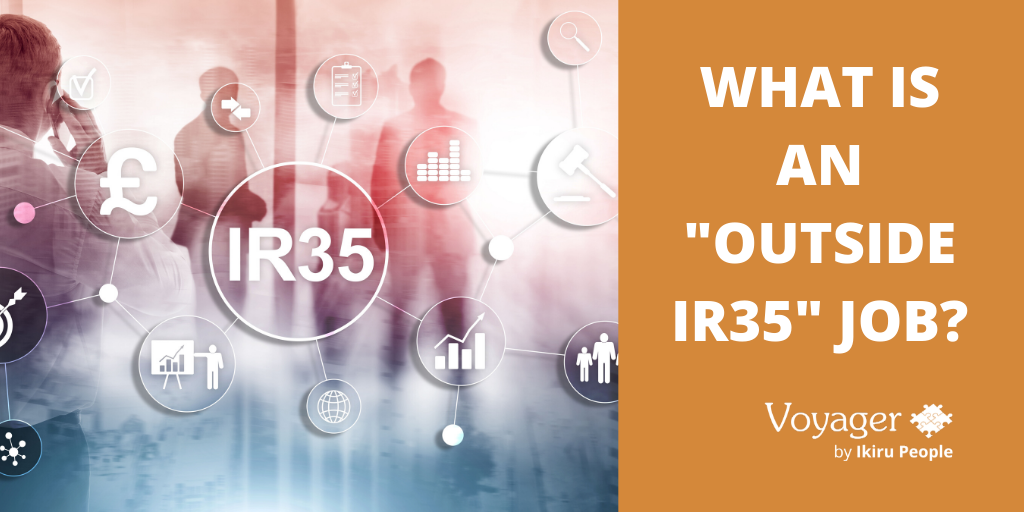There are now just a few months remaining until the heralded IR35 changes kick in, forcing employers across the UK to take ownership for their contractor teams and ensure no workers are actually ‘disguised employees’ hiding from the taxman.
As the shadow of IR35 looms closer, much debate has taken place around the nature of contract work. Everyone is trying to understand who is and isn’t affected by the changes around the corner.
In these discussions, the phrases ‘inside’ and ‘outside’ IR35 are quite common. It’s a potentially confusing way to describe whether the legislation does or does not apply to a particular situation.
So, to save the headache of working it out, here’s some plain English that helps make sense of the madness.

“Outside IR35” – what does it mean?
When people talk about being ‘inside’ or ‘outside’ IR35, they’re making a distinction between those who are considered ‘genuine’ contractors in the eyes of HRMC, and those who are classed as ‘disguised employees’.
If you’re ‘outside’ IR35, it means your work is bona fide contracting. The government is not likely to ask your employer to pay your missing income tax and NI contributions.
If you’re ‘inside’ IR35, it means your contracting gig is a job like any other. And it shouldn’t be classified as a contract engagement.
Many people seem to think of IR35 as the bogeyman of contractors, disrupting the community and looking for ways to shake up a perfectly good arrangement. However, genuine contractors are ‘outside’ the net which HMRC will cast over those who are masquerading as contractors.
Outside = safe.
Inside = time to pay those taxes.
How is ‘outside IR35’ even a thing?
Being ‘outside IR35’ means that your employer or end client has determined that the scope of your engagement classifies you as a genuine contract worker in the eyes of HMRC.
In practical terms, this rests on a few key criteria:
- Under your contract, you must be able to substitute other workers or providers in order to comply with the contract deliverables. The employer does not engage you personally (as in the case of an employee).
- Your contract must also not imply a rolling, open-ended nature with an ongoing obligation to provide services to the employer, nor the employer to supply you with work.
- Your contract must not specify a manager-employee relationship, with a direct supervisor directing and monitoring your work. Rather, it should be built around the provision of deliverables (like a ‘scope of work’).
These, along with a few other provisions, form the backbone of determining whether a contractor is inside or outside IR35.
A relationship looks like an employee contract if it can’t be substituted, has no fixed term, specifies a report line. Then it’s likely to be deemed ‘inside IR35’ and the employer will have to settle the corresponding tax bill.

Why should a recruiter care?
Recruiters have a duty to understand IR35 for a range of reasons.
Firstly, clients will expect their staffing partners to guide and inform them about navigating the changing world of contractor regulation.
Recruiters should naturally be careful not to position themselves as legal experts or provide unqualified advice to clients. But there is a natural assumption that recruiters will know the change’s key aspects and how it impacts contract workers.
Secondly, recruiters and agencies stand to lose big if they cannot keep on top of the repercussions of IR35.
Though it’s unlikely to be the death of contractor recruitment as many had grimly predicted, it will have an impact. Contractors and contract employers will need to adjust the way they engage. And recruitment agencies will need to ensure that IR35 doesn’t crush the much-needed flexibility and expertise provided by the contractor employment model.
So there’s no need to head off to law school just yet. But recruiters who keep pace with regulations and work through compliant tech platforms will not only protect their businesses but distance themselves from the crowd.

Voyager Infinity and Voyager Mid-Office are software solutions that make Recruiters’ lives easier. Voyager Infinity is a CRM used by thousands of recruiters globally to source, nurture and maintain the relationships with their clients and candidates, and Mid-Office manages the entire Pay and Bill process (IR35 ready).

















